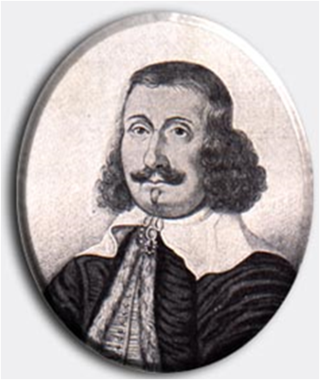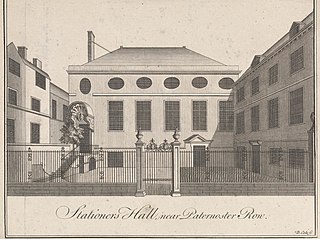Related Research Articles

Thomas Campion was an English composer, poet, and physician. He was born in London, educated at Cambridge, studied law in Gray's inn. He wrote over a hundred lute songs, masques for dancing, and an authoritative technical treatise on music.

Francis Quarles was an English poet most notable for his emblem book entitled Emblems.
Thomas Nabbes was an English dramatist.
Alexander Brome was an English poet.

Francis Beaumont was a dramatist in the English Renaissance theatre, most famous for his collaborations with John Fletcher.
Edward Hake, English satirist, was educated by John Hopkins, the part-author of the metrical version of the Psalms.

Thomas Farnaby was an English schoolmaster and scholar. He operated a successful school in the Cripplegate ward of London and enjoyed great success with his annotations of classic Latin authors and textbooks on rhetoric and Latin grammar.
Robert Tofte was an English translator and poet. He is known for his translations of Ariosto's Satires and his sonnet sequences Alba, The Months Minde of a Melancholy Lover (1598) and Laura, The Toyes of a Traveller: Or, The Feast of Fancie (1597). He also authored a partial translation of Boiardo's Orlando Innamorato and was possibly responsible for the popular and anonymous Batchelar's Banquet (1603) as well. Tofte is perhaps most famous for his incidental reference to Love's Labour's Lost in Alba, the first mention of that Shakespeare play in print.
Thomas Drant (c.1540–1578) was an English clergyman and poet. Work of his on prosody was known to Sir Philip Sidney and Edmund Spenser. He was in the intellectual court circle known as the 'Areopagus', and including, as well as Sidney, Edward Dyer, Gabriel Harvey, and Daniel Rogers. He translated Horace into English, taking a free line in consideration of the Roman poet's secular status; but he mentioned he found Horace harder than Homer. Drant's translation was the first complete one of the Satires in English, in fourteeners, but makes some radical changes of content.
Christopher Brooke was an English poet, lawyer and politician who sat in the House of Commons between 1604 and 1626.
Robert Anton or Anthony was an English poet and satirist.
Patrick Hannay was a Scottish poet and courtier.
Ralph Winterton (1600–1636) was an English physician, academic and humanist. At the end of his life he became the Cambridge Regius Professor of Physic.

John Hall (1627–1656), also known as John Hall of Durham, was an English poet, essayist and pamphleteer of the Commonwealth period. After a short period of adulation at university, he became a writer in the Parliamentary cause and Hartlib Circle member.
Thomas Beedome was an English poet. He appears to have died at an early age, and of his life nothing is known.

On 1 June 1599, Archbishop of Canterbury John Whitgift and Bishop of London Richard Bancroft ordered a ban on a selection of literary works. The works were brought to Stationer’s Hall to be burned. This act of censorship has become known among scholars as the "Bishops' Ban" and is one of four such acts during the reign of Elizabeth I. Debora Shuger has called the order "the most sweeping and stringent instance of early modern censorship."
Abraham Holland was an English poet. He was the son of the translator, Philemon Holland, and the brother of the printer, Henry Holland. His best known work is the Naumachia, a poem on the Battle of Lepanto in 1571.

William Bullein (c.1515–1576) was an English physician and cleric.
James Day was an English verse-writer whose name and writings are but little known.
Henry Parrot was an English epigrammatist.
References
- Attribution
 This article incorporates text from a publication now in the public domain : Bullen, Arthur Henry (1889). "Fitzgeffrey, Henry". In Stephen, Leslie (ed.). Dictionary of National Biography . Vol. 19. London: Smith, Elder & Co. pp. 109–110.; Endnotes:
This article incorporates text from a publication now in the public domain : Bullen, Arthur Henry (1889). "Fitzgeffrey, Henry". In Stephen, Leslie (ed.). Dictionary of National Biography . Vol. 19. London: Smith, Elder & Co. pp. 109–110.; Endnotes: - Corser's Collectanea Anglo-Poetica, part vi. pages 356–60
- Wood's Athenæ Oxon. ed. Bliss, ii. 608.